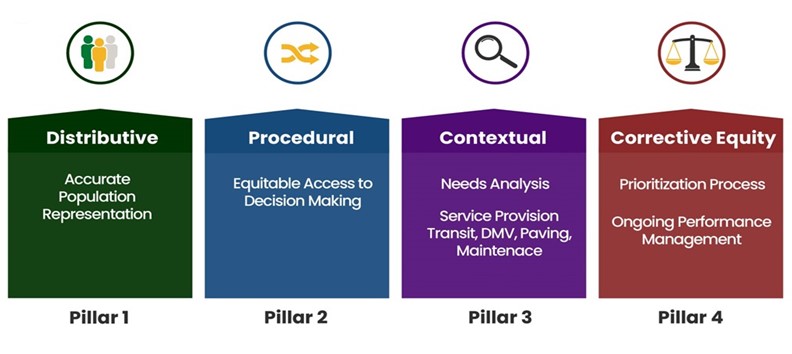The Transportation Equity Framework is a comprehensive set of principles, pillars, and practices established to help the Vermont Agency of Transportation (AOT) address historical disparities and promote equitable outcomes for all people. The framework guides decision-making, project prioritization, and resource allocation for the state’s transportation infrastructure and helps AOT apply for and secure federal funding. Moreover, it demonstrates how other state departments of transportation (DOTs) and metropolitan planning organizations (MPOs) can develop their own transportation equity frameworks. As the primary consultant and team leader on the project, RSG guided the development of the framework, from its inception to the final report.
The Challenge
The US Department of Transportation incorporates equity considerations into new transportation program funding and mandates at the federal level. In response, many state DOTs and MPOs have identified a need to create and implement their own equity frameworks to improve equitable outcomes in communities, guide their transportation planning processes, and remain competitive as applicants in the federal discretionary grant funding process.
At the request of the Vermont legislature, AOT sought to develop an equity-focused framework to guide and inform transportation planning and investments in the state. However, being an innovator in this area meant AOT lacked access to significant equity literature or existing frameworks to benchmark against. AOT knew it needed outside assistance to understand transportation’s impact on equity in the state. AOT selected RSG to lead the project given our extensive experience in transportation planning and our expertise in collecting the data needed to inform the framework.
RSG's Solution
As the lead consultant for the Transportation Equity Framework, RSG took on a multifaceted role spanning project management, background literature reviews, stakeholder engagement, and synthesizing and developing actionable recommendations in the final report.
We started by scanning for national and relevant local equity frameworks, indices, and best practices to identify how other agencies approach the topic. Our team also conducted 10 focused stakeholder meetings with agency staff, partners, and public officials to better understand methods in practice and their perspectives on embedding equity in the transportation sector. Our team convened with the 11 regional planning agencies during several meetings to understand how they are considering equity in their planning and investment decisions.
To better address equity issues at a local level and lay the groundwork for improvements, we established early on that we also needed to engage people in a dialogue and hear from affected communities. As such, we met with four communities that have been historically marginalized, under-resourced, and overburdened and that face similar but distinct challenges surrounding transportation. The groups comprised individuals from different regions, ages, ethnicities, socioeconomic groups, and political perspectives. The diversity in the groups’ composition provided several viewpoints.
After collecting this primary data from quantitative and qualitative sources, we synthesized it into a comprehensive report focusing on four pillars of equity: 1) distributive equity; 2) procedural equity; 3) contextual equity; and 4) corrective equity. Distributive equity focuses on identifying the true diversity of the community to better inform fair outcomes in resource allocation, procedural equity ensures fairness in decision-making processes, contextual equity tailors approaches to individual or group circumstances, and corrective equity aims to redress past injustices and continue to monitor and correct inequities. While they all aim to promote fairness, each type addresses a distinct aspect of equity, from the outcomes and processes to the context and historical conditions.
The outcome of the Transportation Equity Framework and the practical steps contained therein will help guide the AOT and its future transportation initiatives toward more equitable outcomes for all residents. The framework will also provide a solid foundation for other agencies to use in developing their own transportation equity frameworks.

Download PDF
Can we stay connected?
Sign up for RSG emails to keep up with our news & insights.

